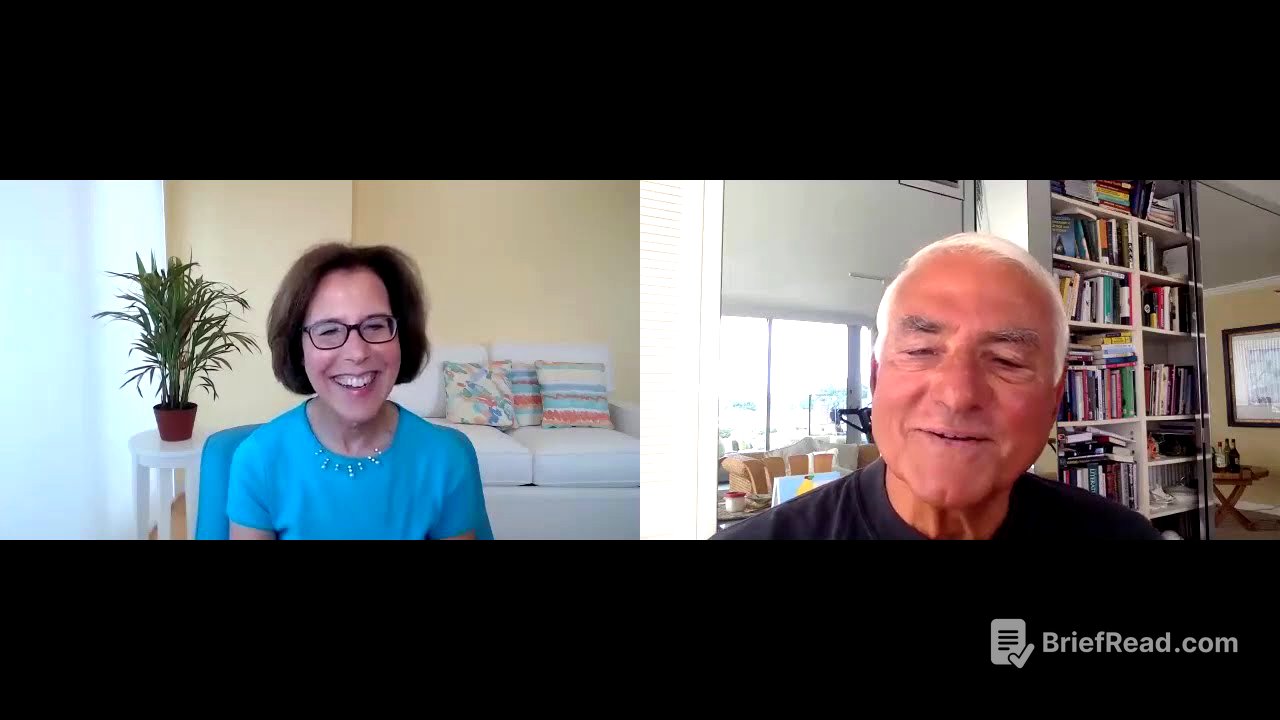TLDR;
This video features an interview with Judy Beck, President of the Beck Institute for Cognitive Behavior Therapy, by Alan Francis, former chair of the DSM-4 task force. They discuss the evolution and current state of Cognitive Behavior Therapy (CBT), focusing on the integration of a recovery-oriented approach. The conversation covers applications of CBT in various settings, from inpatient psychiatric facilities to outpatient clinics, and addresses the importance of adapting CBT techniques to individual needs and cultural contexts. Key points include:
- The shift towards recovery-oriented CBT, emphasizing positive experiences, emotions, and adaptive thinking.
- Strategies for engaging patients with serious mental health conditions and fostering a sense of purpose and meaning.
- The significance of the therapeutic relationship and tailoring treatment to individual needs rather than rigidly following manuals.
- The global reach and ongoing evolution of CBT, with a focus on training and certification to maintain high standards.
Introduction [0:12]
Alan Francis introduces Judy Beck, highlighting her expertise in Cognitive Behavior Therapy (CBT) and her father, Tim Beck's, significant contributions to the field. Francis expresses his early intrigue with CBT due to its clinical innovation, teachability, and potential to bridge research and practice. He notes CBT's extensive positive impact on millions of people and its continuous evolution, expanding its applications and techniques.
The Cognitive Model and Recovery Orientation [2:15]
Judy Beck acknowledges Alan Francis's early support for CBT and discusses how CBT has evolved while maintaining its core cognitive model. This model emphasizes that people's reactions are influenced by their perceptions of situations and their thoughts. A key aspect of CBT is addressing distorted thinking common among individuals with psychiatric disorders or psychological problems. The discussion shifts to a more recent recovery orientation, focusing on positive experiences, emotions, and adaptive thinking to promote well-being.
Integrating Recovery with CBT Techniques [4:28]
Judy Beck explains the recovery movement's focus on helping individuals with serious mental health conditions live fulfilling lives by finding meaning, purpose, safety, control, competence, and worth. This approach aims to shift individuals from a disconnected or depressive state to an adaptive mode, fostering more helpful thinking and behavior. She details how her father, Tim Beck, has been working to integrate this recovery orientation into cognitive therapy, particularly for individuals with serious mental health conditions, including those hospitalized for extended periods.
Application in Inpatient Settings [7:06]
Judy Beck describes the challenges of working with patients who have been hospitalized for long periods, including engaging both the patients and the hospital staff. She emphasizes the importance of addressing the staff's beliefs and helping them recognize the patients' humanity. Strategies include asking staff to identify when patients are at their best and what is important to them, then teaching the staff to better engage patients through activities that bring pleasure or accomplishment. The goal is to equalize the relationship by finding patients' talents and showing interest in their aspirations, even if those aspirations seem unrealistic.
Visualizing Aspirations and Adaptive Conclusions [9:23]
The approach involves helping patients visualize their aspirations and explore the meaning behind them. Staff encourage patients to create strong visual images of their hopes and dreams, using all their senses, and then discuss the details of these images. The focus is on identifying what the individual could do in the present to experience some of the positive feelings and sense of purpose associated with their aspirations. By creating positive experiences, patients can draw adaptive conclusions about themselves and shift into an adaptive mode, leading to improved well-being and, in many cases, a lower level of care or discharge from the hospital.
Humanity and Meaning in Treatment [11:52]
Judy Beck emphasizes the importance of recognizing the shared human desires of patients, such as good relationships, competence, productivity, and a sense of purpose. She notes that even delusions and hallucinations often stem from trauma, fear, or a need for safety. By creating supportive environments, patients may no longer need to rely on unhelpful coping mechanisms. Alan Francis adds the importance of the spiritual dimension, highlighting the need for therapy to provide meaning and help individuals find their own path to a worthwhile life.
Adaptability and Evolution of CBT [13:31]
The discussion highlights CBT's remarkable adaptability and evolution compared to other psychotherapies. Judy Beck attributes this to her father's curiosity and scientific approach, which led him to question psychoanalytic dogma and seek empirical evidence. She emphasizes the importance of questioning established thinking and conducting research to find better explanations for observations. Alan Francis notes that psychoanalysis made a mistake in rejecting Tim Beck's contributions, which could have enriched the field.
Integrating CBT and Psychodynamic Approaches [17:33]
Judy Beck notes that many psychodynamic psychotherapists now use CBT techniques, particularly when working with clients with personality disorders. While CBT often focuses on the present and future, exploring the past can be valuable in understanding how patients developed certain beliefs about themselves and the world. However, the emphasis is increasingly on a recovery orientation, helping patients achieve the lives they want. Having a coherent personal narrative can be important for patients, and CBT helps them take action to create a different future.
Applying the Recovery Model in Outpatient Settings [19:44]
Judy Beck describes how the recovery model is applied in outpatient settings, starting with identifying values rather than setting goals. Techniques from Acceptance and Commitment Therapy (ACT) are incorporated to help people identify what is truly important to them. The focus then shifts to aspirations and how patients want their lives to be different. By identifying values and aspirations, therapists can help patients set specific goals for treatment.
Session Structure and Emphasis on Positive Experiences [21:18]
In each session, the structure is based on the cognitive model, but the content is different. Instead of focusing on problems, the emphasis is on goals and steps toward those goals. Therapists help patients identify specific steps aligned with their values and aspirations, addressing potential obstacles using standard CBT techniques. The focus is on the coming week and what patients want to be different, rather than dwelling on past problems.
Mood Check and Action Plans [23:13]
The traditional mood check is supplemented with an assessment of well-being. Therapists ask about positive experiences and encourage patients to assess their sense of well-being. More time is spent reviewing action plans and positive experiences. When patients successfully complete assignments or report positive experiences, therapists ask what that means to them and what it says about their capabilities.
Summarizing the Outpatient Approach [25:39]
Judy Beck summarizes the outpatient approach, emphasizing starting with values and aspirations, identifying the best parts of those things, and helping patients experience positive emotions in the session. This serves as a bridge to helping them achieve positive experiences in the coming week. Alan Francis notes that this shift in emphasis can make a significant difference in the therapeutic relationship and how therapists and patients work together.
Efficacy and Learning the Recovery-Oriented Approach [27:05]
Judy Beck mentions that data is being collected to assess the effectiveness of recovery-oriented CBT (r-CBT). She believes that nothing is lost in this approach, as it is more of a shift in emphasis than a complete departure from traditional CBT. She discusses the availability of training in r-CBT through the Beck Institute's programs, online courses, workshops, and the third edition of "Cognitive Behavior Therapy Basics and Beyond." A book specifically on recovery-oriented cognitive therapy for serious mental health conditions is also mentioned.
Training and Resources for CBT Therapists [29:29]
Judy Beck confirms that the Beck Institute is teaching the recovery-oriented approach alongside traditional CBT, providing a rationale for its use. She emphasizes the need for solid research before fully replacing traditional CBT. For current CBT therapists, resources include online courses, training programs, and supervision. While reading the book can provide a nudge in the right direction, supervision is essential for effective implementation.
Accessibility and Global Application of CBT [31:16]
Alan Francis raises the issue of the shortage of CBT therapists worldwide and asks whether reading the book can help experienced clinicians modify their practice effectively. Judy Beck expresses hope that it can, noting that many people have successfully practiced CBT through exposure to important books. She also highlights the application of CBT in community settings in developing countries, where basic CBT skills are taught to community leaders. CBT needs to be adapted to various cultures and human experiences.
Stoic Philosophy and Manual-Based Therapies [34:12]
The discussion touches on the connection between CBT and stoic philosophy, which emphasizes that people's perceptions of events, rather than the events themselves, lead to suffering. Judy Beck explains that this applies to both negative and positive emotions. The conversation shifts to the use of manuals in therapy, with Judy Beck emphasizing that therapists should understand the principles in the manuals but individualize treatment for each client. Manuals are essential for randomized controlled trials but should not be used slavishly in practice.
The Therapeutic Relationship [36:30]
Judy Beck underscores the importance of the therapeutic relationship, noting that entering treatment requires courage and that therapists should assume patients may not feel completely safe initially. Therapists need to be acutely aware of the patient's emotional experience and address any negative thoughts or assumptions the patient may have about the therapist or treatment. Positively reinforcing patients for giving negative feedback is crucial for solving problems.
Eliciting Feedback and the Human Element [38:52]
Judy Beck shares an anecdote about a patient who disliked filling out feedback sheets, illustrating the importance of making the session right for the patient. She emphasizes the need to elicit feedback during and at the end of sessions. The human element is the most important aspect of treatment, and therapists should positively reinforce patients for taking even small steps toward getting better.
Criticisms and Misunderstandings about CBT [41:04]
Judy Beck addresses the criticism that CBT therapists are slaves to the manual, hoping to dispel this notion. She clarifies that the Beck Institute uses manuals for research purposes but does not want them to be used slavishly in practice. Following the manual can distract from the patient, so it should be part of the therapist's background knowledge but not the focus of each session.
Duration of Treatment and Financial Constraints [41:54]
The duration of treatment varies and is usually a decision made jointly by the patient and therapist. As patients improve, sessions can be spaced out, and booster sessions can be used to ensure continued use of CBT tools. Financial constraints may limit treatment duration, in which case therapists should focus on the most important goals and teach skills that apply to multiple goals.
Global Overview of CBT and the IAPT System [43:35]
Judy Beck discusses the Increasing Access to Psychological Therapies (IAPT) system in the UK, where CBT is the primary therapy used. This system triages patients based on the severity of their depression, with those with mild depression receiving online self-help courses or self-help groups, while those with moderate to severe depression see psychotherapists. The most seriously impaired patients see the most highly trained professionals. This system is also being used in several other countries.
CBT Around the World and Certification [44:55]
CBT's strength varies by country, with strongholds in Scandinavia, Australia, Japan, China, and New Zealand. The prevalence of traditional psychotherapy influences CBT's adoption. The Beck Institute is now certifying CBT therapists and accrediting organizations to address the problem of therapists claiming to do CBT when their practices are not recognizable. The goal is to improve lives worldwide through excellence in CBT innovation, training, practice, and research.
Continuous Learning and Legacy [48:08]
Judy Beck emphasizes that becoming an expert in CBT takes a lifetime and that continuous learning is essential. She still learns from every patient and supervisor. Alan Francis praises Tim Beck's legacy of tackling the toughest problems in psychiatry and coming up with practical solutions.
Adaptability and Conclusion [49:12]
Alan Francis concludes that people can adapt what CBT offers to what they already do, as long as they avoid debating, degrading, controlling, or acting superior to patients. He notes that different therapists can have different intensities of exposure to the new model, with some relying on the book and others availing themselves of more intense training. Judy Beck adds that the new edition of "Cognitive Behavior Therapy Basics and Beyond" includes a more severely depressed patient and videos of patients to show what therapy looks like in action. She emphasizes the importance of watching great therapists and treating difficult patients, as they are the ones who need the most help.









